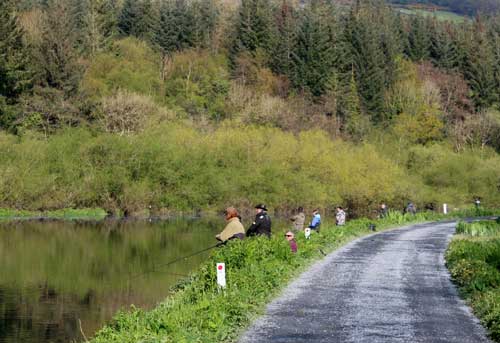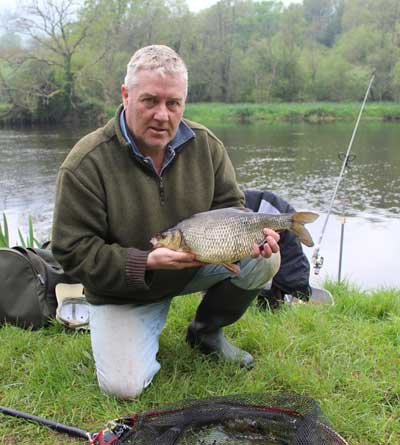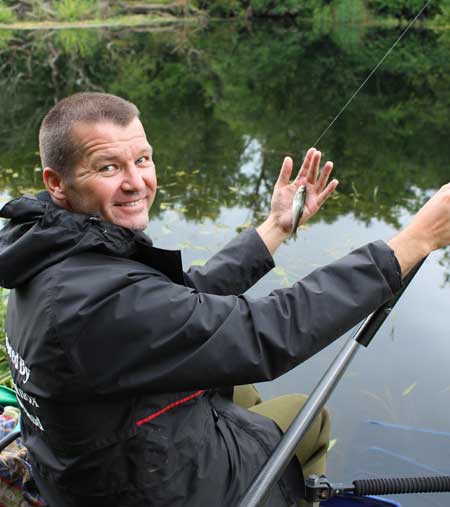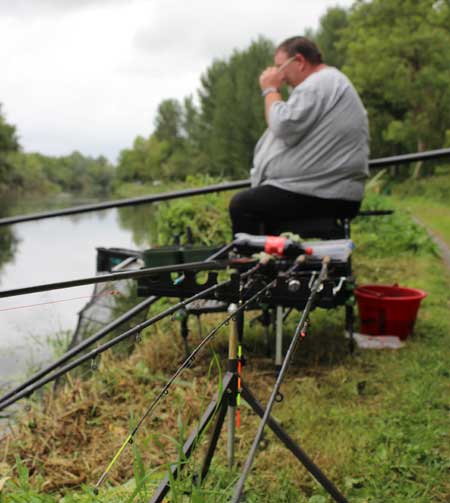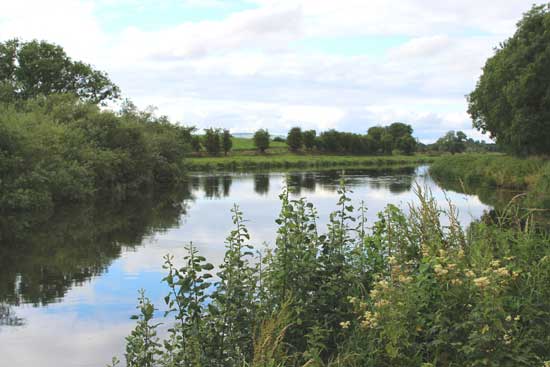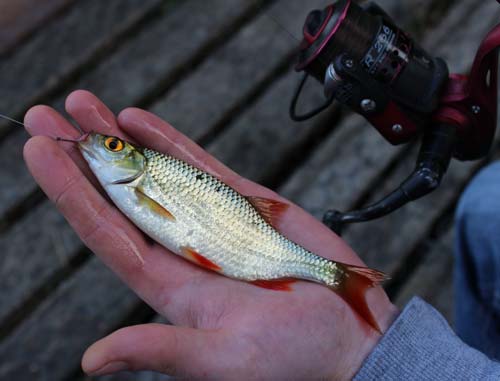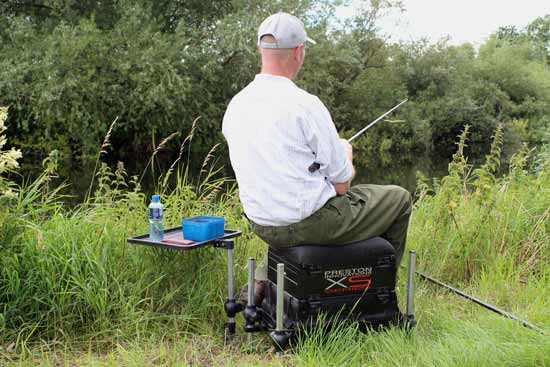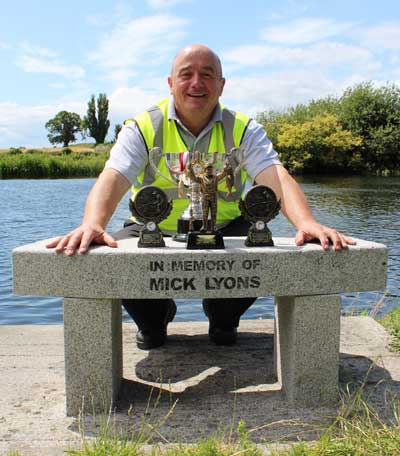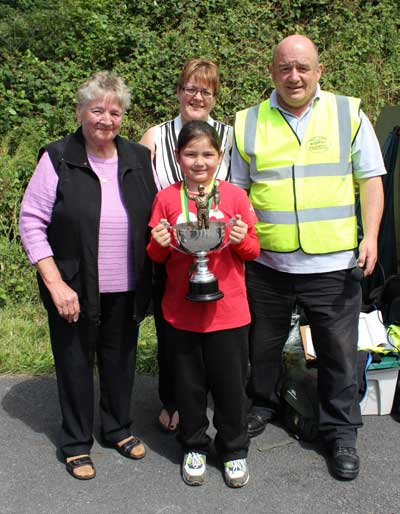I first cast a line on the Beara peninsula in May 2005, close to the Dursey cable car, a 32 gram silver Kilty catcher and at a count of forty seconds, yes Dursey sound is that deep, I hit mackerel. Since then I have traveled down annually, sometimes bi-annually, on one fateful trip meeting and chatting with Roger Ball on the rocks at Garnish. Born out of that conversation developed a friendship centered around sea fishing, soccer and a love of the bountiful marine paradise which the rich coastal waters off Beara are, or should I say were, because they are under attack, from within.

Roger and his longtime friend Dave Hoskins have been traveling across from the United Kingdom and down to Beara for years, Roger came first in 1997. Both Cornishmen, they talk about how good the fishing was in the 1970′s around Plymouth where they grew up and how it was destroyed by over fishing. When Roger by accident found the Beara in 1997 while driving around Ireland he thought that he had landed in heaven, for there before his eyes were vast shoals of open sea mullet, his favourite fish to catch. From then on he returned most every year to walk the dogs along coastal paths with his wife and to fish.
Between Roger, Dave and I we have 22 years of knowledge built up about the shore fishing from Dunboy in Castletownberehaven around to Urhan close to Eyeries. In that time shore fishing mainly from rock platforms we have caught 21 species of fish ranging from bass to wrasse. What amazed us about the fishing was how many of the resident species such as conger, wrasse, pollack, bull huss, mullet, plaice and dab grew to their full potential size and also the numbers of fish available which in this day and age of over fishing at sea was staggering.

Well it was too good to last, year on year when we returned the fishing was as good if not better than the time before. Yes one could add that our improved catches were predicated on a build up of acquired knowledge, however the quality of fish and fishing never changed, for seventeen years it remained constant. Then in 2014 we noticed a change, the mullet were not as plentiful and the average size of pollack and wrasse on the marks that we fished began to shrink noticeably. Then, the clean ground marks which were paved with large dab up to specimen size began to produce less fish. Could all this be our collective imaginations running wild, were we losing our touch or getting paranoid. No, a trip planned for June 2019 unfortunately revealed everything that we had suspected.
On Saturday 22nd June 2019 we arrived at our holiday cottage all geared up for a weeks fishing. On the way we had supped Guinness in McCarthy’s Bar, Castletownbere, devoured bowls of Adrienne’s lovely chowder with brown bread and dug fleshy lugworms for a well looked forward to ground fishing session. The weather was not great, strong south to south east winds and rain but we persevered, lure fishing with spinners to catch a few medium size pollack but no mackerel on the first evening.
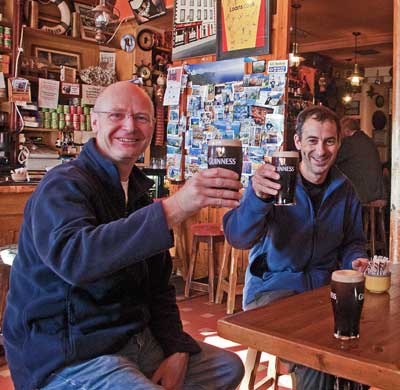
Sunday was a washout however things improved on Monday enough to seek out mullet and shore fish locally again for pollack and the hoped for mackerel which along with the mullet again were marked absent. A couple from northern Ireland who were fishing on a favoured mark near our cottage mentioned how they had been traveling down to fish for years but that on the last number of visits a perceptible decline in the fishing had set in. Might it just be an aberration said I, no it’s the result of gill netting they categorically said. My heart sank, as this is what Roger, Dave and I had always suspected but could not prove. The evidence was there, smaller fish sizes, dearth of mullet and flatfish, but we had never seen evidence, that is until the next morning Tuesday 25th June 2019.
With full tide around 11.30 am and a pet day ahead of us we hiked out onto the headland to a favourite mark which traditionally produces plenty of large pollack and wrasse. The form of this mark without fail is rods on the first cast doubling over to quality pollack hitting jelly worms. Numerous casts later we were fish less before a couple of juvenile pollack hit our lures, something was dreadfully amiss. Roger decided to wrasse fish and yes he had bites to hardback crab from the get go, but not from the mothers that we used to catch, instead their half pound offspring made up the offering. We were mystified but deep down knew, then we were informed.

The half decker tootled across the bay eventually lining up about eighty meters offshore commencing to shoot its net right across our casting line. It had taken us an hour to walk out and now we could not fish as this obvious gill net ( we could see it slipping over the stern of the boat) was well within our casting range. To add insult to injury a crew member lifted up a good size pollack and taunted us with it smiling as he motored by.
The really sad part is that they did not even have the whit to consider that it was tourists from another country they were mocking. Tourists that are long term friends and admirers of the Beara, tourists who sing its praises and encourage others to consider visiting, tourists who come twice a year, tourists who spend good money on accommodation, in O’Neills of Allihies, McCarthy’s Bar, Supervalu, the local petrol station, etc.
Now we knew the source of decline and it created a sick feeling in the stomach, a feeling of helplessness because Roger, Dave, Rob and I all knew the outcome of the action we were observing, a negative reduction of the fishery. These individuals were doing nothing wrong according to Irish law, they could carry on regardless and will, we all knew that nobody was going to stop this violation of a pristine marine biosphere, a diamond in the rough. I couldn’t continue fishing and said to the lads I’m heading back, they hung on for a while but eventually succumbed also as their heart was not in it.
For years we had respected this place, catch and release, an odd fish for the pot, our angling was a conduit, a way to connect with nature and give something back in return, the stories of basking sharks, dolphins playing tag, gannets diving, the sea alive with flashing fish, the few bob left in various local businesses, on Tuesday 22nd June 2019 modern life from our perspective caught up with paradise and chewed it up.
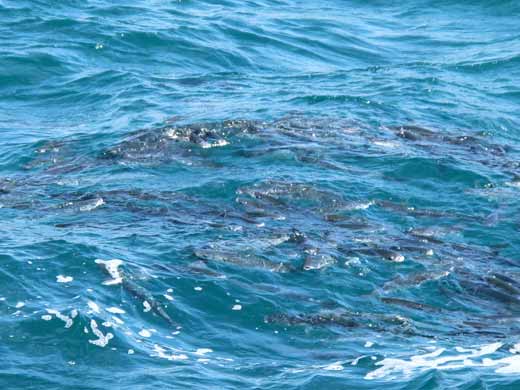
As stated earlier in this piece, from 1997 until 2014 the shore fishing we encountered between Crow Head and Cod’s Head to include Dursey never changed, it was totally consistent and always surprising us in the affirmative. To witness the mullet shoals was in itself incredible, when they merged with mackerel and sprat as we saw on occasions the spectacle was blue planet stuff.
Marine spectacles as described above are less likely to occur now in and around Dursey bay because post 2014 gill netting, using in this instance a net approximately 500 meters long (a legal practice) which did not occur in this area to the scale that we witnessed before 2014, has taken out the vast resident mullet shoals and is now having a right go at the pollack, flatfish and whatever else swims into their indiscriminate invisible plastic meshes. To cap it all the boat was targeting prime wrasse to be used as pot bait, what an ignominious end for a wonderful sport fish.
This writer comes from a family with coastal fishing in its bones, was taught how to dig bait, long line, trammel net, lay pots, tie knots, row boats and understand the sea by my father, grandfather and uncles. I was taught to respect the sea and respect the creatures within it. I was taught how to maintain a fishery by leaving some for tomorrow, never to be greedy. If this plunder continues, which it will unless there is Government, EU, or better still local intervention, there will eventually be no adult fish left and the dynamic of a wonderful local unique to Ireland marine ecosystem will be altered forever. It may take a decade or two but it will happen as evidenced on Ireland’s east coast.

It would make you weep, in just a few short years the fishing has been damaged, not as yet mortally, but if it is not curtailed the future for the coastal bays off Dursey Island and Allihies Bay is stark and I should know, I saw the incredible mixed fishery off Greystones Co. Wicklow disappear before my eyes within ten years once the mussel dredging commenced. However the future for Dursey could be different as there is still time, again it just needs people to be informed and not be afraid to speak out.
No one is saying for one moment that local people in rural areas should not earn a contribution to their living from fishing, quite the opposite in fact, community managed sustainable artisan inshore coastal fisheries are part of the solution to marine over fishing. However, in that context no individual has the right to say that a shared resource is theirs alone, which is exactly what is happening on the Beara peninsula and other such places around the Irish coastline and the state has to recognise this fact and be the catalyst for social change by introducing radical inclusive legislation acknowledging that all citizens have a stake in the marine and not just those who choose to commercially fish.
A way forward would be for the state to Firstly, ban monofilament gill and tangle nets forthwith as they are lethal indiscriminate fishing engines, continue to fish as “ghost nets” if lost in storms and these same lost nets become major contributors to micro plastic pollution as they eventually rot and break up. Instead artisan line fishing should be promoted and encouraged as an inshore fishing methodology which is more environmentally friendly being less indiscriminate and also delivers a higher quality end product for market.
Secondly, the targeting of ballan wrasse for pot bait should be banned immediately and instead fishermen/women should be encouraged to obtain carcasses and fish heads from fish processing operations for pot bait instead.
Thirdly, community managed marine protected zones should be established in key areas such as the Beara around the country to protect and preserve wild places, nursery areas, habitats and local ecosystems which are the foundation stones for the wider marine biosphere. These zones would not necessarily be no take but most certainly would be net free, with creeling (potting) allowed inside under a management plan, commercial line fishing outside or along the perimeter where the over spill of prime fish would occur, and sea angling would be catch and release using barbless hooks.
The above is a loose template but has merit for further discussion as within its frame resides inclusivity which is key to successful long term management of Ireland’s coastal resources. The present modal is predicated on take while giving nothing back as this story shows and that path as is abundantly clear has led Ireland’s and the worlds marine fisheries to where they are today, broken and or severely strained.
Meanwhile those who make a living or contribution to their income from fishing complain of lack of fish, or reduced access to fish when in actual fact there are reduced numbers of fish relative to what there was because of the methodologies and approach that the industry they are part of employs. In effect the industry is shooting itself in the foot while those who work within the sector point the finger at everybody but themselves as to why they cannot catch or access whatever fish are left. This race to the bottom breeds a mentality of take what you can while it is still there before someone else gets it.
In this day and age of climate change, biodiversity loss and musings on the value of natural capital how we interact with resources is vital and obviously changes in approach are essential. Sadly, when it comes to what is left of sea fishing in rural areas trying to introduce change is akin to sucking blood out of a stone as the same old cliches will be trotted out with vehemence even when the fishing as it used to be has died. Its our resource, we looked after it, its what we have always done. Compromise, which is the way forward, where everybody benefits will be a dirty word but that is where we must go.
So if anyone has read this piece and been moved by it, please send a letter or email to the Minister for fisheries, Minister for Tourism, Environmental NGO’s, Inland Fisheries Ireland, the CEO of Failte ireland and anybody else you can think of who might make a difference at a national decision making level, calling for protection of our wild marine places, the adoption of environmentally friendly fishing methodologies and practices and recognition of all stakeholders when it comes to resource use management. Your efforts could just make a difference. Thank you………..
PS: The images used in this piece are from previous trips, not the one described above.
Ashley Hayden © June 2019




